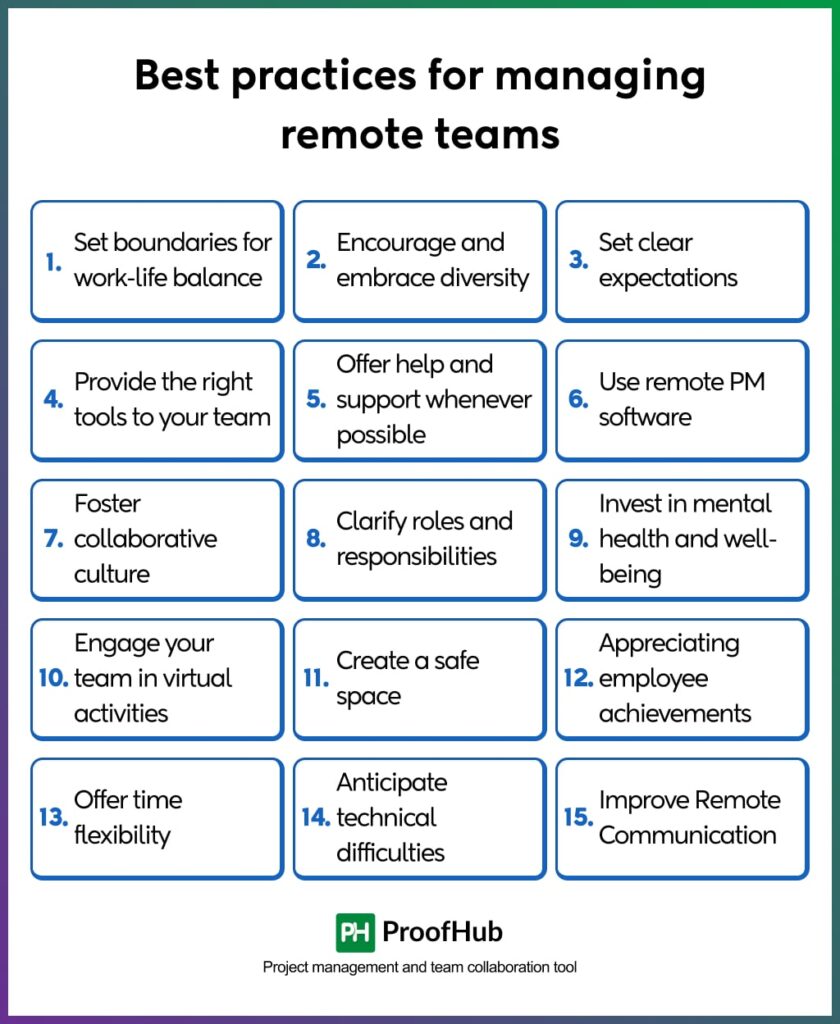Introduction
Managing remote teams requires a different skill approach to communication and collaboration, compared to the traditional in-person teams. Although remote work offers many benefits, distributed teams can cause miscommunication, feelings of isolation, and difficulty in monitoring progress.
In this article, we will discuss the challenges of managing remote employees and effective strategies for remote team management.
Challenges in managing remote teams
To make remote work effective there are a few challenges that you should take care of, including:
- Communication issues: Maintaining clear and effective communication with team members in different locations and devices can be difficult.
- Monitoring performance: Tracking the productivity and performance of remote employees can be challenging, it requires reliable tools and methods to ensure accountability.
- Managing different time zones: Coordinating schedules and meetings with team members working across various time zones can lead to mismanagement and communication gaps.
- Making everyone feel part of the team: While working remotely, some employees might feel left out or disconnected from the team, impacting their morale and engagement.
- Collaboration: Collaboration and teamwork on projects or different tasks can be harder without physical proximity and spontaneous interactions.
- Onboarding and training: Providing effective onboarding and training remotely can be less impactful than in-person sessions.
- Consistency in work standards: Maintaining work quality and standards across all team members can be challenging.
- Conflict Resolution: Addressing and resolving conflicts among employees remotely can be more complicated due to the lack of face-to-face interaction.
- Feedback process: Providing timely and constructive feedback to the virtual team can be less straightforward remotely.
- Lack of cohesion within the team: Creating a sense of team unity and maintaining strong relationships can be harder without face-to-face interactions.
How to manage remote teams?
Many companies like Aha, NationBuilder, Automatic Buffer, and many more have successfully worked as 100% remote companies. Still, many companies are going through thick and thin to successfully adapt to remote work.
Managing virtual teams is a new role for most managers and it requires a slightly different set of skills to effectively manage the employees remotely. It requires strong leadership skills to ensure that team members remain productive, engaged, and aligned with the organization’s goals.
Now, let’s get into the best practices you should follow to manage a remote team effectively.
Best practices for managing remote teams

1. Set boundaries for work-life balance
Remote teams often need some kind of boundaries to outline their work and personal lives.
As the teammates are working from different time zones any notifications chat messages or emails can affect someone’s sleep or disturb their family time.
Discuss work schedules with each team member by respecting their time and showing them that you care for their time.
This will help in building positive relationships with employees making sure nothing is too hard for anyone.
2. Encourage and embrace diversity
It is no surprise to come across cultural obstacles when managing remote teams. The problem with multicultural teams involves misunderstandings and conflicts that divide the teams apart.
It becomes pretty hard to manage people of different races, embracing cultural diversity to allow team building.
A simple way is to find how different people from different areas are open to receiving feedback, promote a mindset of celebrating differences, be respectful about national holidays for your global team, and respect every cultural difference.
3. Set clear expectations
Every manager has some expectations from their team members: whether working remotely or virtually. Being clear with employees will keep them focused on working towards the same goals.
This process involves defining specific, measurable, achievable, relevant, and time-bound (SMART goals) objectives that team members are expected to achieve. Clear goals provide direction and help ensure everyone is working towards the same targets.
You should set clear expectations for:
- Work hours
- Availability
- Communication system
- Timely meetings
- Key projects and deadlines
- Scheduled meetings
- Respond to email
4. Provide the right tools to your team
There are various types of teams, such as designers, developers, support, calling, and more. Each team requires different tools based on their specific needs. It’s essential to provide the right tools to your team, ensuring they have what they need to perform their best. Here is the list of tools that help during remote work:
- ProofHub: Project management and team collaboration tool
- Canva: Designing tool
- Github: Developer and bug tracking tool
- Google Drive: File management tool
- Zoom: Video conferencing tool
6. Offer help and support whenever possible

Make sure you have regular 1:1 meetings with every team member. In these meetings, ask your team members if they are facing any issues or if they are encountering any difficulties while remote working. Always be ready to solve problems.
If team members need any support or training, always communicate with your company about this issue. Provide supportive training whenever possible, as this will help create a positive and collaborative environment between team leaders and members.
7. Invest in the remote project management software
Your remote team working culture will flourish when you have everything under one roof.
And this can be made possible when you rely on remote team management software to plan tasks, projects, and even people. Here’s what you can do with project management software:
- Communicate with your scattered team
- Keep track of project evolution
- Track productivity
- Maintain and manage timesheets
- Share information in real-time
- Have discussions
- Manage the tasks on a task list
- Interact across different time zones
8. Foster collaborative culture
Fostering a collaborative culture in remote teams is essential for enhancing productivity, creativity, and team cohesion.
To encourage collaboration, you can start with small virtual team-building activities that help break the ice and build trust among team members. These activities can be casual virtual coffee breaks or more structured games to improve teamwork and communication skills.
Additionally, using collaborative tools is crucial to facilitate teamwork. Platforms like ProofHub offer features that support real-time communication, file sharing, and project management.
9. Clarify roles and responsibilities
As a leader of the team, you should clearly assign the roles and responsibilities of each team member. It is vital for maintaining efficiency and ensuring that everyone knows their specific duties and contributions to the larger project.
To clarify you should outline their primary tasks, responsibilities, and expectations. By doing this, you create a transparent framework that helps team members understand their roles and how they contribute to the project’s overall success.
10. Invest in mental health and well-being
Working remotely offers many benefits, however, working in isolation can bring different challenges. As a manager, you should make it a priority to help your employees deal with these situations. As a team leader, it can be tough to see what problems your team members might have while working from home.
Some people adapt to remote work easily, while others find it hard. It’s important to determine what each person is struggling with and offer support based on their needs.
You can support remote employees by providing these facilities:
- Schedule Regular One-on-One Check-Ins
- Provide Mental Health Support
- Allow Flexible Working Hours
- Organize Virtual Team-Building Events
- Encourage Open Communication Policies
- Offer Wellness and Fitness Programs
10. Engage your team in virtual activities
Building a collaborative environment while working remotely is essential for team success. Team-building activities help to foster teamwork and collaboration among team members. Here are some effective virtual activities you can implement:
- Virtual Escape Room
- Online Trivia Quizzes
- Two Truths and a Lie
- Virtual Cooking Classes
- Digital Scavenger Hunt
- Icebreaker Questions
- Virtual Coffee Breaks
- Virtual Fitness Challenges
11. Create a safe space
When you are managing a remote team, there can be different personalities in your team. So it is important to establish a safe space for every team member, where they feel comfortable and respected.
Research indicates that a safe space encourages employees to share their problems, thoughts, and ideas without fear of judgment. When employees feel comfortable and heard, their performance automatically improves, which helps to boost the productivity of team members.
12. Appreciating employee achievements
Always highlight your remote employees in important meetings. You might inform the company to showcase the team’s success. When you recognize a team member in front of higher-level executives, it makes your team feel appreciated and valued.
As a team leader, always keep this in mind and seize every opportunity to celebrate your employees in important meetings. Remember, recognition can greatly enhance morale and foster a positive team culture.
13. Offer time flexibility
In a remote work setup, employees can come from different countries and time zones. Instead of making everyone work at a standard time, you can assign shifts based on their respective time zones to ensure your team members are productive and work in a shift they feel comfortable with.
For example, if one team member is in New York and another is in London, scheduling a meeting at 3 PM Eastern Time means the London member has to join at 8 PM. Instead, if you schedule it for 9 AM Eastern, it will be 2 PM for London, making it easier for everyone to participate comfortably.
14. Anticipate technical difficulties
Technical issues are a common part of remote work, whether it’s problems with internet connectivity, keyboards, or cameras. Since most companies provide laptops or desktops to their employees, it’s essential to anticipate and tackle these challenges without placing blame.
To effectively manage technical problems, collaborate closely with your IT team. Having a plan in place will help minimize disruptions and ensure your team stays productive.
15. Improve remote communication
Many remote working teams come across a setback in communication when working on projects. It is always going to be difficult to connect with your teams in different areas without having good communication skills.
And of course, online communication skills. As you start with the conversation, be quick and concise, so the teams do not get confused.
Develop your writing skills, talk precisely, and use the right remote collaboration tools to collaborate effectively as awesome communication is vital in the remote workplace.
Conclusion
Managing remote teams is not as easy as it sounds, however by following the best practices you can do wonders for your business. Having the right tips and tricks on effectively managing remote employees, you should be ready to create an energetic business with your remote workers.
If your remote team is already working at its peak, what are your amazing tricks and tips for managing a remote team at its best?
Good luck with your remote working culture!

